Astana–Rome: Kazakhstani pragmatism with an Italian accent
The visit of Italian Prime Minister Giorgia Meloni to Kazakhstan marked a qualitatively new stage in the development of bilateral relations between Astana and Rome. An analytical review by a Kazinform News Agency correspondent explores the outcomes of the visit and the prospects for Kazakh-Italian friendship.
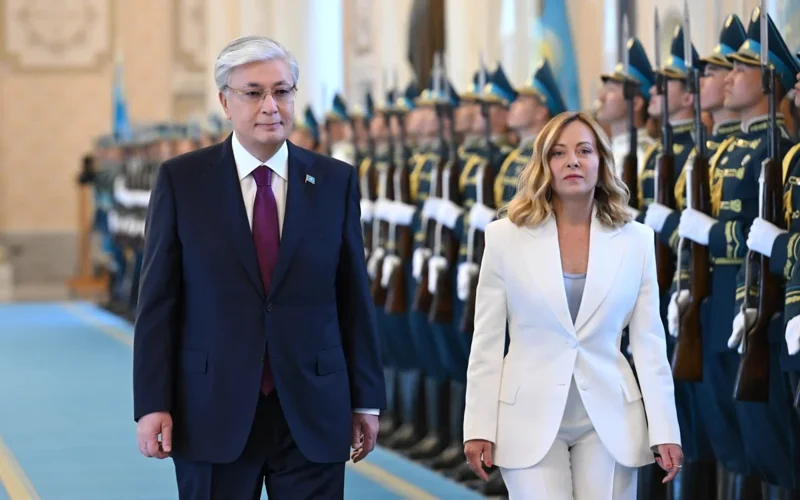
Regional and international context
The official visit of Giorgia Meloni to Kazakhstan, along with her participation in the first "Central Asia + Italy" summit and the Astana International Forum, marked a significant milestone in developing both bilateral relations and regional cooperation with the EU.
The Italian Prime Minister was received in the finest traditions of Kazakh hospitality. Kassym-Jomart Tokayev personally met her at the aircraft stairs with a bouquet of pink peonies, while the traditional Kazakh chapan particularly suited the Italian guest.
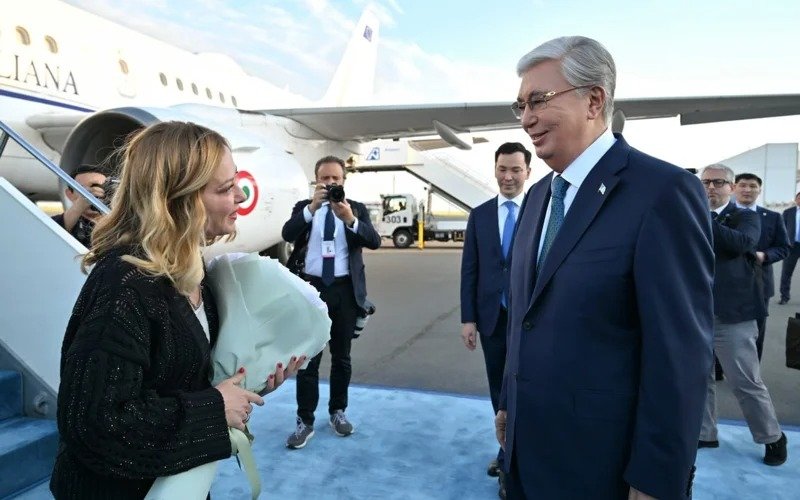
The informational backdrop of the negotiations was mutually complimentary. Italy's Premier called the Kazakh President "one of the most pragmatic leaders" she had encountered. Indeed, pragmatism defined the tone of the meetings - the dialogue platforms featured concrete, constructive proposals to intensify bilateral and multilateral cooperation.
"Your visit is a major event in our bilateral cooperation. We attach special importance to strengthening mutual ties and trust. Italy is Kazakhstan's third-largest trading partner globally and the largest in Europe. We must maintain the high momentum of our cooperation," the Head of State noted while receiving Giorgia Meloni at the Akorda.
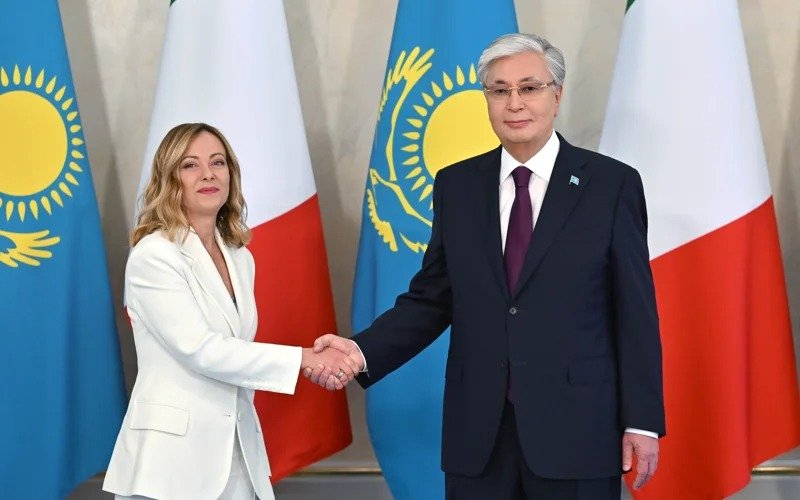
The Italian government leader showed equal interest in strengthening relations. Speaking at the plenary session of the Astana International Forum, she called Kazakhstan Italy's strategic partner and Central Asia an important crossroads of Eurasia.
Economy, business and investment
During negotiations, Kassym-Jomart Tokayev noted that bilateral trade grew by 24%, reaching $20 billion last year. Over the past 20 years, Italy has invested $7.6 billion in Kazakhstan's economy. Approximately 270 Italian companies, including major investors ENI, SDF Group, PetroValves, Maire Tecnimont, and Ballestra, operate successfully in the country.
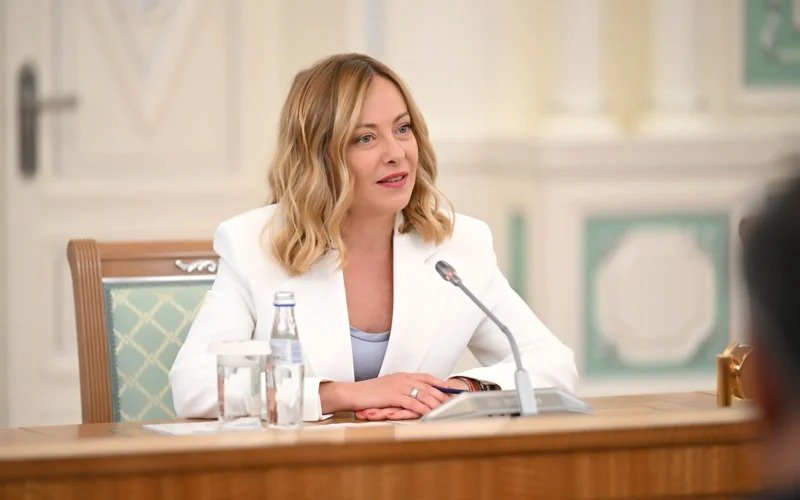
"This is extremely valuable. In these difficult times, there is good news - the exceptional relations between Italy and Kazakhstan. Our ties are at a high level, but there are always opportunities for further strengthening. This is precisely the purpose of this visit," the Italian Prime Minister emphasized.
Following the meeting, several documents were signed, including a Joint Statement on Strengthening Strategic Partnership and an Agreement on Cooperation in Critical Minerals and Raw Materials.
Particular attention was drawn to the memorandum between Samruk-Kazyna Fund and Italian industrial giant Maire Tecnimont regarding gas separation plant and petrochemical facility projects in Atyrau region.
"We are pleased that through open dialogue, KMG chose our group as a partner for strategically important projects. But cooperation will not be limited to these projects alone. We see prospects for relationships extending far beyond their scope," noted Maire Tecnimont CEO Alessandro Bernini.
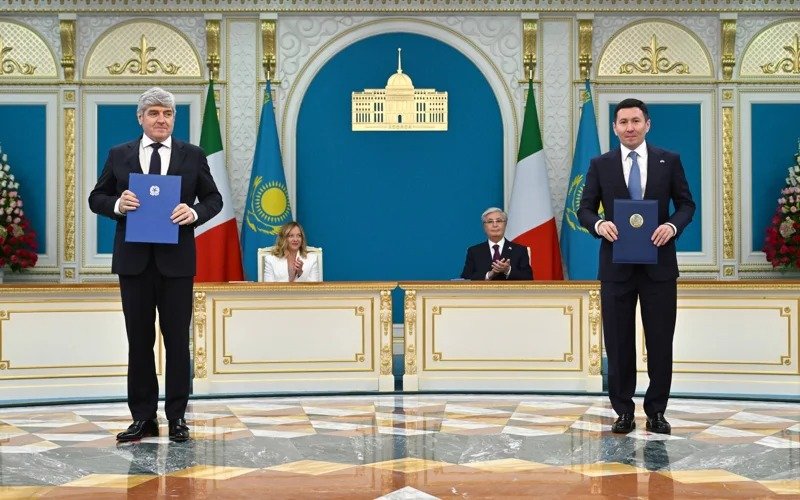
Bernini emphasized his company's readiness to work with Kazakhstan's human resources and production base, adapting projects to the country's technological sovereignty strategy. This approach aligns with Astana's priority - transitioning from raw material exports to industrialization and high value-added product supplies.
The Italy-Kazakhstan Business Forum made a significant contribution to economic cooperation development. Contracts worth €180 million were signed, covering mechanical engineering, agro-processing, metallurgy, petrochemicals, and logistics digitalization.
Italy ranks among the top 10 largest investors in Kazakhstan's economy. Production localization projects and technology transfer are becoming the new norm in cooperation. Beyond the oil and gas sector, Italian companies are represented across many spheres.
"Agriculture, petrochemicals, mechanical engineering, tourism, logistics, rare earth metals — all these can become pillars of our cooperation. These are sectors of industrial transformation. Italy offers know-how, industrial technologies, innovative small and medium enterprises, and a unique opportunity to combine competitiveness with sustainability," noted Deputy Minister for Enterprises and Made in Italy Products Valentino Valentini.
Agro-industrial cooperation is also in focus. Kazakhstan expressed readiness to increase exports of organic grain, oilseeds, and feed, proposing to establish joint processing and packaging lines for agricultural products under a unified brand for international markets.
"Central Asia + Italy": a gateway to regional integration
The "C5+Italy" summit became the key event of Italian Prime Minister Giorgia Meloni's visit to Kazakhstan, confirming Rome's interest in sustainable cooperation with all countries in the region.
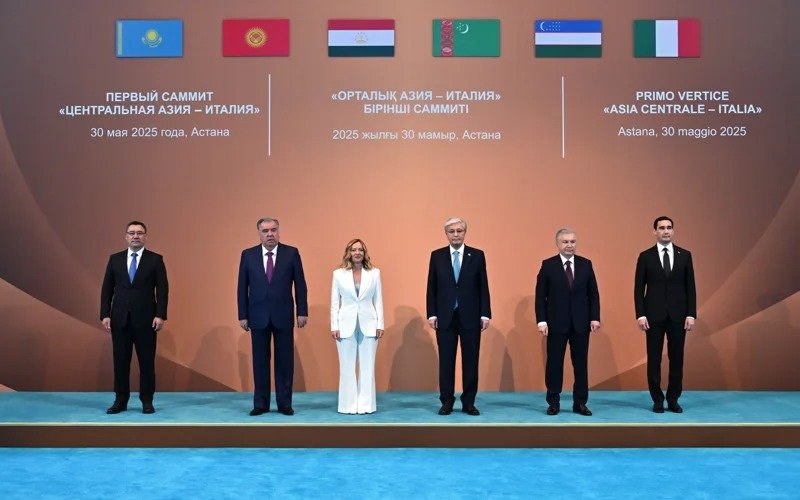
Kazakhstan, as Central Asia's largest economy and logistics hub, served as meeting coordinator, providing a platform for systematic negotiations and signing key agreements. Italy, acting as a "bridge" between the EU and Central Asia, promotes sustainable infrastructure, the "green" agenda, and cultural-humanitarian cooperation, including education and tourism.
The opening of trade houses and logistics centers could provide serious impetus to trade expansion. Opening an Italian Trade House in Almaty was proposed. Another initiative announced was the creation of a Regional Research Center to gather and analyze up-to-date information on rare earth metal deposits in Central Asia.
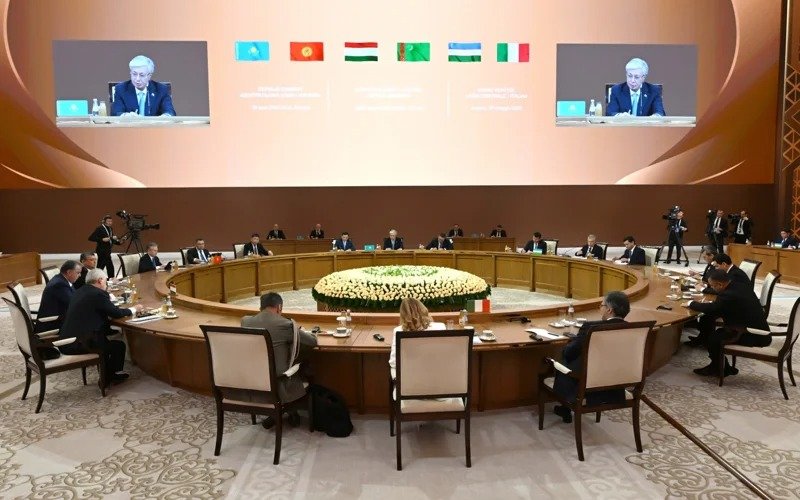
Energy – a strategic pillar of our cooperation
The energy sector traditionally serves as the main driver of cooperation.
"Our country ranks among the three largest oil exporters to the European Union. Last year, Kazakh oil deliveries to the Italian market exceeded 30 million tons — 27% more than the previous year. If necessary, we are ready to increase current volumes," said the President.
Experts highly value Italy's role in global supply chains for Kazakh hydrocarbons to international markets.
"When we speak of Kazakhstan and Italy's oil 'friendship,' we mean not simply oil exports. This is about long-term strategic partnership. Today Italy is our key energy ally in Europe. The main portion of Kazakh oil traveling through the Caspian Pipeline passes through its ports, then by tankers to the Mediterranean Sea," notes oil and gas industry expert Askar Ismailov.
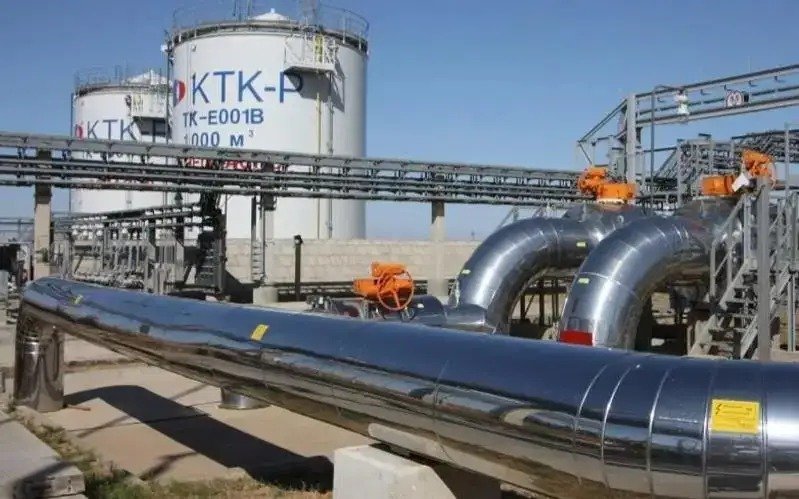
But logistics is only part of the picture. Italian company Eni is one of the key investors in the Karachaganak oil and gas field, which produces over 20 billion cubic meters of gas annually and 11 million tons of gas condensate. This is especially important under conditions of global transition to low-carbon energy, when natural gas becomes transitional fuel.
"In the future, it's necessary to return to discussing the third phase of Karachaganak field development. According to 2009-2010 estimates, investment volume was about $25 billion. Today, considering market conditions and equipment cost increases, we may be talking about $50 billion in investments. This is enormous stimulus for the country's economy," the expert believes.
Theoretically, the field with current gas reserves could ensure production up to 100 billion cubic meters annually. This could involve liquefied gas supplies and logistics development using ecological fuel, especially in the European direction.
"Considering that the Karachaganak production sharing agreement expires in 2037, now is the optimal time to begin dialogue with investors about extending the agreement and launching a new project phase. Moreover, within further oil and gas project expansion, there's serious potential for attracting equipment and technologies from leading Italian manufacturers. This concerns gas compression, automation, design, and environmental control," Ismailov notes.
This cooperation could become not only an economic but also technological breakthrough, since Italian business knows the Kazakh market well, trusts the country, and continues to be an important partner on the path to an energy future.
Points of attraction
The President identified strengthening transcontinental connectivity as another pressing task. In his view, by developing the Trans-Caspian International Transport Route, countries are essentially reviving the ancient Silk Road on a new foundation.
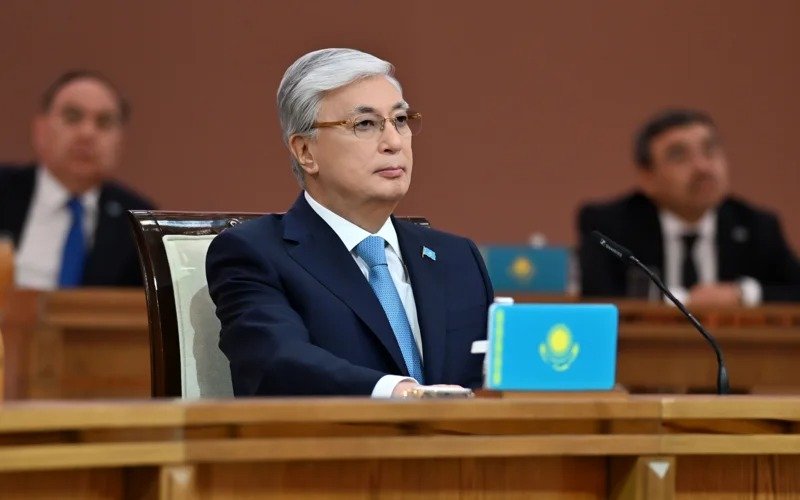
"Last year, container transportation volume on Kazakhstan's section of this corridor increased by 62%, reaching 4.5 million tons. Within three years, we aim to double this figure," the Head of State noted.
Giorgia Meloni considers the Middle Corridor one of the most promising directions for CA-Italy cooperation in developing digital and physical infrastructure.
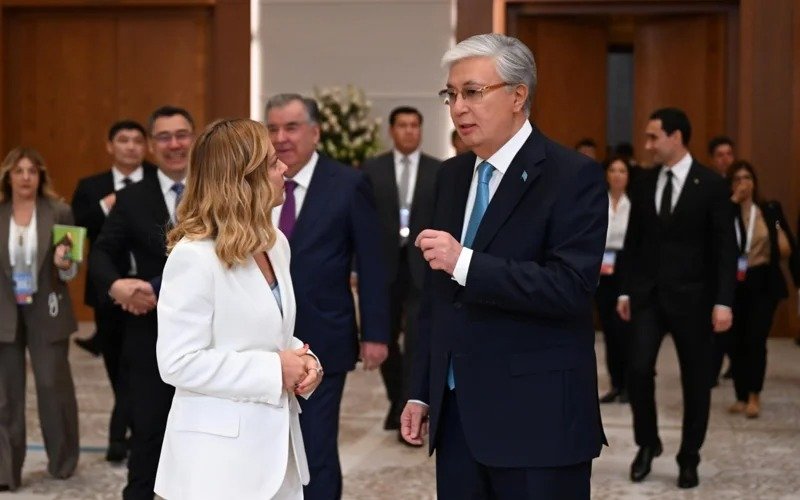
Majilis deputy Aidos Sarym commented to Kazinform News Agency that Kazakhstan's development of new routes and search for new formats is both natural and highly promising.
"Since ships now circumnavigate the African continent, the maritime route has significantly lengthened," the deputy said, emphasizing that the transcontinental Middle Corridor has a speed advantage, with goods delivery taking 15-18 days. "During this time, the Majilis has ratified about five to six major documents facilitating this route. Thanks to TITR, cooperation has strengthened and expanded with at least 40 countries."
Educational and cultural cooperation has become another point of attraction. Currently, approximately four thousand Kazakhstani students study in Italy.
"Taking this opportunity, I invite Italian technical universities to open branches in Kazakhstan. We pay special attention to engineering and technical education," said Kassym-Jomart Tokayev.
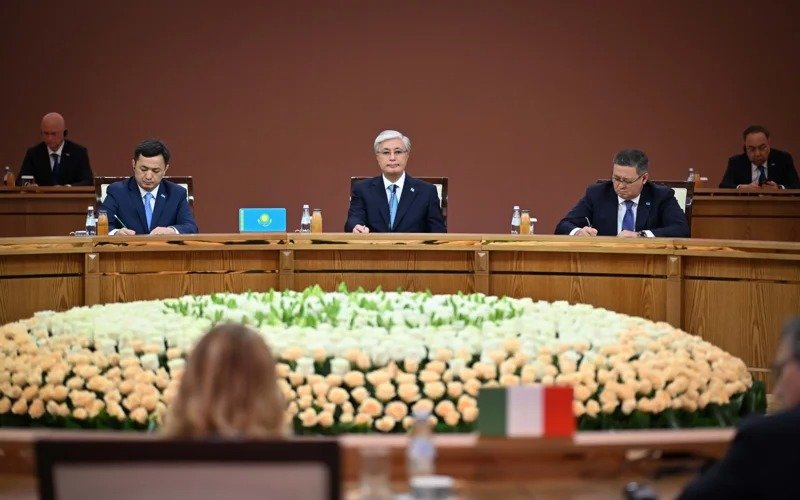
In this context, Italy offers technological solutions and expertise in energy, chemistry, water resources, fintech, and supply chain management. Companies like Maire Tecnimont have already begun cooperation with Kazakh universities, opening opportunities for personnel development and technological self-sufficiency.
Visit outcomes
Astana and Rome possess a solid foundation for expanding cooperation in energy, industry, logistics, and sustainable development. Significant prospects emerge in innovation, technology exchange, and new forms of interaction in a rapidly changing world.
For Kazakhstan, this represents an opportunity to accelerate industrialization, strengthen integration into global supply chains, and enhance investment attractiveness. For Italy, it's a chance to consolidate positions in Central Asia, gain access to resources and markets, and demonstrate to the EU the effectiveness of its own foreign economic strategy.
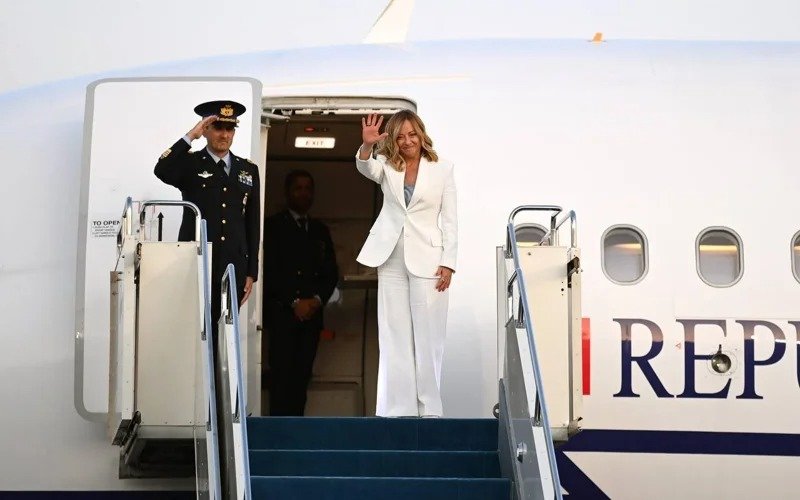
Earlier, Kazinform News Agency reported that 2026 has been designated as the Year of Cultural Rapprochement of Central Asia and Italy.
